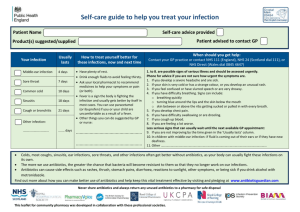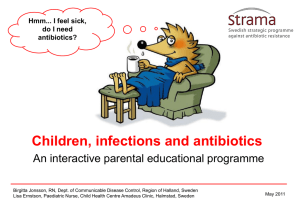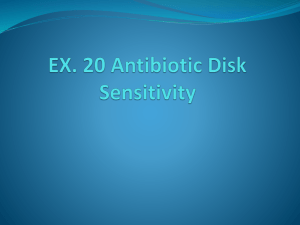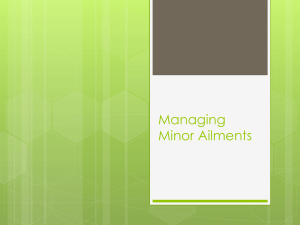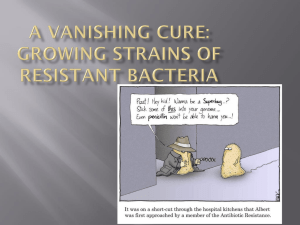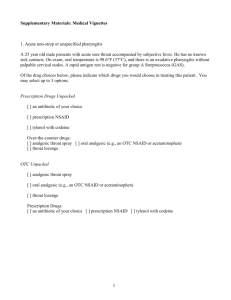Powerpoint Slides on Antibiotics for Surgeries and Pharmacies
advertisement
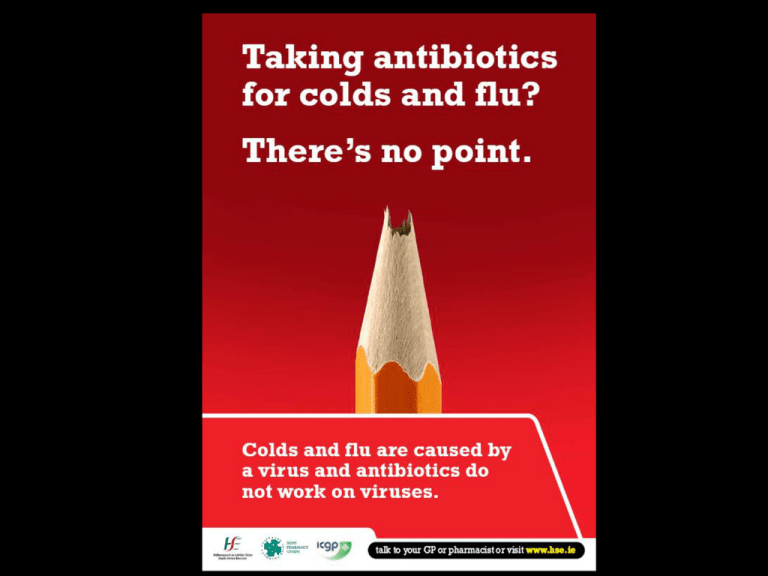
What are antibiotics? Antibiotics are medicines used to treat infections that are caused by bacteria (germs). Antibiotics cannot treat infections caused by viruses (such as colds and the flu). Taking antibiotics when you don’t need them, like for a cold or flu, is a waste and will not help you get better. There is no point! When are antibiotics not needed? • Most common infections are caused by viruses. • This includes all colds, most coughs, sore throats, ear infections and diarrhoea. • Antibiotics do not work against these infections. • Most of these illnesses get better themselves without antibiotics. When do antibiotics work? • Your doctor may prescribe antibiotics if you have an infection caused by a bacteria such as a chest infection, pneumonia or a kidney infection. • Antibiotics are life-saving for infections such as meningitis. Some examples.... Common Cause: Virus Common Cause: Bacteria Head cold, runny nose, cough Urine /kidney infection Sore throat, sinusitis Ear infections in children Persisting cough , cough in people with chest problems , high fever or very unwell Vomiting and diarrhoea Skin infections e.g cellulitis Meningitis Antibiotics rarely needed Antibiotics may be needed Why is there no point taking antibiotics for colds and flu? • Taking antibiotics when they aren’t needed might mean that they won’t work when you really need them for a serious infection. • If you take many courses of antibiotics, bacteria can change so that the antibiotic does not work against them any more. • These bacteria are said to be “resistant” to this antibiotic and are much harder to treat. Why is there no point taking antibiotics for colds and flu? • Taking antibiotics when they are not needed also puts you at risk of side effects, like a rash, upset stomach or diarrhoea. TREATING MY COLD OR FLU – WHAT CAN I DO? • The best way to treat most colds, coughs or sore throats is to drink plenty of fluids and get some rest. • You can take paracetamol or ibuprofen to relieve headache, aches and pains and fever. Ask your doctor or pharmacist for advice about over-thecounter remedies. • If you are taking medicines for other conditions you must check with your doctor or pharmacist before taking other over the counter remedies EXAMPLES OF OVER THE COUNTER REMEDIES Symptoms Runny nose, blocked nose or congestion Treatment Nasal decongestant spray, Oral decongestant syrup or tablets Menthol & Eucalyptus oil preparations Sore throat Honey & lemon, anaesthetic lozenges Paracetamol or ibuprofen Cough in an adult Antitussive for dry cough - to stop you coughing Mucolytic or Expectorant for chesty cough - to help you break up mucus Paracetamol or Ibuprofen Fever, pain, joint or muscle aches Cough in a child Discuss with doctor or pharmacist. When should I start to feel better? Do you know how long common illnesses last? Ear infection around 4 days Sore throat around 1 week Common cold (runny nose) around 1½ weeks Sinus infection around 2½ weeks Cough (which often happens after a common cold) around 3 weeks 3 things to remember if you are prescribed an antibiotic 1. Take them exactly as prescribed. 2. Make sure you finish the full course, even if you begin to feel better, to get rid of the bacteria completely. 3. Do not ‘save’ left over antibiotics for the next time you, your child, or any other family member is sick. - Medication prescribed for you now may not be the right medicine for you again or for another person. TAKING ANTIBIOTICS FOR COLDS AND FLU? THERE’S NO POINT • Most common infections don’t need antibiotics – they get better by themselves • Taking antibiotics when you don’t need them puts your health, and your family’s health at risk • If your doctor decides that you need an antibiotic, make sure you take it exactly as prescribed • Your pharmacist can advise you on over-thecounter remedies that can help to treat many common infections Where can I get further information? www.hse.ie/go/antibiotics
